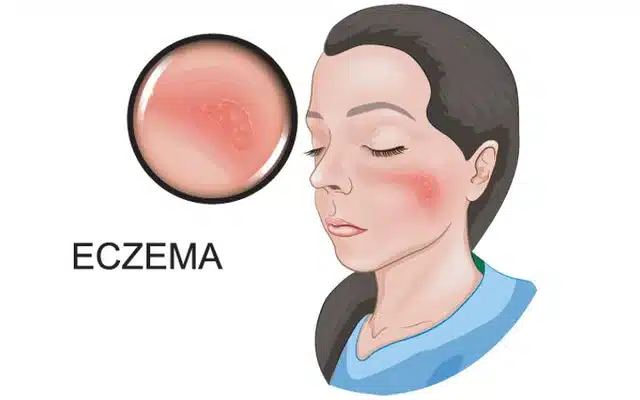The Efficacy Of Borage Oil For Eczema: A Comprehensive Review
Eczema, with its red, itchy patches, can turn everyday activities into uncomfortable challenges. Finding a soothing solution is a top priority for those who grapple with this persistent skin condition.
Amidst the myriad of remedies and treatments lies borage oil—a natural option that has captured the attention of individuals seeking relief from their eczema symptoms.
Recent studies have delved into whether using borage oil—an extract known for its high gamma-linolenic acid content—can alleviate atopic dermatitis. While some individuals report positive experiences after incorporating borage oil into their skincare routines, an objective, comprehensive review indicates no substantial evidence to support its effectiveness in treating eczema.
This article aims to sift through the research and present an informed view of borage oil’s role in managing eczema. Ready to uncover what science says? Let’s explore together!
Key Takeaways
-
- Borage oil has a special fat called GLA that may help with eczema by reducing inflammation and soothing the skin.
-
- Some studies show borage oil could be good for treating eczema, but others do not see a big difference when using it.
-
- When you use borage oil, you might get side effects like tummy troubles or headaches. It can also mess with some medicines.
-
- Doctors suggest taking 1 to 3 grams of borage oil daily for eczema, but always ask your healthcare provider first.
-
- The research is mixed on whether borage oil helps with eczema. More study is needed to figure out how well it works.
Understanding Atopic Dermatitis and its Causes

Atopic dermatitis, known as eczema, is a chronic inflammatory skin condition characterized by dry, itchy rashes. The exact cause of atopic dermatitis is multifactorial and involves genetic predisposition, immune system dysfunction, and environmental factors.
Essential fatty acid metabolism plays a crucial role in the pathogenesis of atopic eczema, with defective delta-6-desaturase function observed in many atopic patients. Understanding these underlying mechanisms is essential for exploring treatment options such as borage oil supplementation.
Essential fatty acid metabolism and its role in atopic eczema
Our bodies need essential fatty acids to build healthy cells and smooth skin. But in people with atopic eczema, something goes wrong with the way these fats work. The body struggles to make a special fat called gamma-linolenic acid (GLA).
Without enough GLA, the skin can dry, red, and itchy.
Borage oil is rich in GLA. This powerful oil might help fix the problems in how essential our skin is to use fatty acids. People use borage oil to strengthen their skin barrier and calm inflamed eczema spots.
It’s like giving your body the building blocks to restore smoother, less irritated skin.
Defective delta-6-desaturase function in atopic patients
People with atopic dermatitis might have trouble with an enzyme called delta-6-desaturase. This enzyme is important because it helps make substances that stop inflammation. When it doesn’t work right, people don’t have enough of these helpful substances in their blood.
Borage oil has a special fat called GLA that can be good for the skin and may help fix this problem.
Borage oil could make the delta-6-desaturase enzyme work better. This would mean more good substances to fight inflammation and less dry, itchy skin from eczema. Studies show that taking borage oil might lead to less skin irritation for those atopic conditions.
The Benefits of Borage Oil for Eczema

Borage oil contains gamma-linolenic acid (GLA), an omega-6 fatty acid known for its anti-inflammatory properties. Studies have shown that GLA supplementation can help improve symptoms of atopic dermatitis, making borage oil a potential natural treatment option for managing eczema.
With its promising benefits, many individuals are turning to borage oil as a complementary approach to conventional treatments for eczema management.
Gamma-linolenic acid (GLA) and its anti-inflammatory properties
Gamma-linolenic acid, or GLA for short, is a special fat that fights inflammation. It’s found in the seeds of some plants like borage and evening primrose. When you have eczema, your skin gets red and itchy because parts of it are swollen.
This happens when your body’s defense system reacts too strongly to something. GLA helps stop this overreaction by making substances that calm down the swelling.
People take borage oil, which has GLA, to help with their eczema. The oil works from the inside out to soothe the skin and reduce dryness and itchiness. Think of it as a quiet helper that tells your body’s defense system to relax when dealing with eczema flare-ups.
Since it comes from natural plant sources, adults and children looking for help with their skin issues often consider using borage oil rich in GLA.
Studies on GLA supplementation for atopic dermatitis
Several studies have investigated the use of GLA supplementation for atopic dermatitis. Here are some key findings from these studies:
- A study showed that oral borage oil and evening primrose oil did not significantly improve eczema symptoms compared to placebos used in trials.
- Research suggests that nutritional supplementation with omega-6 essential fatty acids, such as those found in borage oil, may hold promise for treating atopic dermatitis.
- High-dose borage oil supplements have not significantly improved eczema symptoms, challenging previous beliefs about its efficacy.
- Topical application of borage oil has been suggested as an effective approach to treating eczema.
- However, it’s important to note that a review of multiple trials using borage oil for atopic dermatitis has yielded mixed results, with many studies showing some benefits. In contrast, others did not demonstrate overall efficacy.
Considerations When Using Borage Oil
When considering using borage oil for eczema, it’s important to be aware of potential side effects and interactions with other medications. Following recommended dosages and consulting a healthcare professional before starting any new supplement regimen is crucial.
Possible side effects
Borage oil may cause some people minor stomach discomfort, such as gas bloating and headaches. Its topical use might lead to skin reactions, although everyone’s skin responds differently.
- Minor gastrointestinal adverse effects like gas and bloating
- Headaches
- Possible skin reactions with topical use
Interactions with certain medications
When using borage oil, consider possible interactions with certain medications. These interactions can include effects on blood clotting and potential adverse outcomes when combined with specific drugs. It’s important to be cautious and consult a healthcare professional or pharmacist before using borage oil alongside any medications to ensure safety and effectiveness. Here are some common medications that may interact with borage oil:
- Blood Thinners: Borage oil might affect blood clotting, so it’s essential to be cautious with anticoagulant or antiplatelet medications such as warfarin or aspirin.
- Seizure Medications: Borage oil could interfere with the effectiveness of certain seizure medications like phenothiazines, so discussing this potential interaction with a healthcare provider is crucial.
- Non-steroidal Anti-Inflammatory Drugs (NSAIDs): Combining borage oil with NSAIDs may increase the risk of bleeding or bruising due to its potential impact on platelet function.
- Blood Pressure Medications: Borage oil may lower blood pressure, so it’s important to monitor blood pressure levels closely alongside hypertensive medications to avoid excessive blood pressure drops.
- Other Herbal Supplements: Concurrent use of borage oil with other herbal supplements could lead to unknown interactions, highlighting the need for professional guidance before combining different natural remedies.
Recommended dosage
The recommended dosage of borage oil for eczema varies but typically ranges from 1 to 3 grams daily. It is important to consult with a healthcare professional before starting any supplementation regimen, especially if you are taking medications or have underlying health conditions.
Additionally, follow the specific instructions provided by your borage oil product manufacturer.
It’s vital to consider potential side effects and interactions with other medications when determining the appropriate dosage of borage oil for eczema. Balancing the benefits and risks while working closely with a healthcare provider can help ensure the safe and effective use of borage oil as part of your overall management plan for eczema.
The Potential Role of Borage Oil in Managing Eczema
Borage oil, derived from the borage plant, has been investigated for its potential in managing eczema. Studies have indicated that borage oil may offer benefits due to its high content of gamma-linolenic acid (GLA), which possesses anti-inflammatory properties.
This essential fatty acid plays a role in maintaining the skin structure and physiology, potentially aiding in alleviating symptoms associated with atopic dermatitis.
Moreover, clinical trials and meta-analyses have explored the relationship between plasma essential fatty acid changes and clinical improvements in patients with atopic eczema following supplementation with borage oil.
The efficacy and tolerability of borage oil supplementation remain areas of interest for researchers studying its impact on conditions like eczema. However, it’s important to consider individual variations in response and any possible side effects or interactions with medications when considering borage oil for managing eczema.
FAQs
1. What is borage oil, and how does it help eczema?
Borage oil, sometimes known as starflower oil, contains GLA (gamma-linolenic acid) that can reduce inflammation and help ease symptoms of skin conditions like eczema.
2. Can children with atopic eczema use borage oil?
Children with atopic eczema might benefit from borage seed oil since studies have examined its effects on reducing skin dryness and irritation.
3. How do you use borage oil for treating eczema?
You can apply topical borage oil directly to the affected skin area or take oral supplements containing borage seed oil to address the symptoms of atopic dermatitis.
4. Is there a difference between taking fish and borage oil for eczema?
While both are anti-inflammatory, fish oil and borage seed oils have different types of fatty acids; some people find one works better than the other in managing their eczema symptoms.
5. Are there any side effects when using oral evening primrose or topical application with borage oils?
Some people might experience minor issues, but clinical trials suggest that most don’t have serious problems when they take these oils orally or put them on their skin for conditions including eczema.
6. Do I need a doctor’s prescription for BORAGE OIL products?
No, products like creams or oral supplements containing BORAGE OIL are available over the counter without needing a prescription from your doctor.

